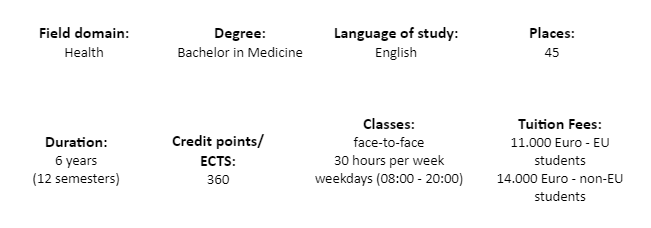Overview

Mission
The Faculty of Medicine of “Titu Maiorescu University” is an established higher education institution, with outstanding results in the specific field of activity, according to a long tradition.
The main mission of the Faculty of Medicine is to educate the next generation of highly skilled healthcare professionals, competent and specialized in the medical field and in other interdisciplinary fields for practicing in public and private health units at local, national and international level.
The Faculty of Medicine values the modern teaching methods and puts a lot of emphasis on a professor-student partnership, so that the transfer of know-how becomes efficient and our graduates develop the highest professional competencies in order to face all the challenges of a future medical career. By constantly adapting the curriculum to current standards of medical education and by providing a student-centered teaching system, the Faculty of Medicine ensures a thorough training for future professionals in the medical field.
Career opportunities
Graduates can be employed in public or private medical institutions, or can pursue a career based on their medical degree in various fields of activity (pharmaceutical companies, medical equipment companies, specialized international activities, health insurances, research, etc.).
For independent medical practice there are necessary further studies for the graduates.
Further studies
- Specialization through national residency program
- Postgraduate specialization studies
- Master study program
- PhD study program
Course outline
The didactic activity at all the study programs of the Faculty of Medicine is in accordance with the recommendations of the European Union in the field of specializations sectorally regulated, regarding the profession of doctor.
The academic year is structured in two semesters of 14 weeks each, with an average of approximately 30 hours per week. The classes are held during weekdays, 08:00 – 20:00. Each semester has 30 transferable study credits in the European system (ECTS).
The study programme consists of compulsory and elective courses, divided into two blocks:
Pre-clinical subjects (1st to 3rd year)
Preclinical curriculum is based on the building blocks of theoretical disciplines from the fields of basic sciences (anatomy, histology, physiology, medical chemistry and biochemistry) and humanities sciences (philosophy, psychology, languages), as well as disciplines regarding pathological conditions and processes.
Preclinical disciplines are held within the IOR campus:
- anatomy laboratory – a modern laboratory, of our own conception
- physiology and pathophysiology laboratory – equipped with modern equipment and materials necessary for the study
- laboratories of histology, cell biology and genetics – fully equipped with quality equipment specific to the current standards necessary
- biochemistry laboratory – completely renovated and with modern equipment.
Clinical subjects (4th to 6th year)
The clinical activity is carried out in the specialized clinics with which the university has contracts. Among them, we list Monza Hospital, CF Clinical Hospital No. 1 Witting, CF Clinical Hospital No. 2 Bucharest, Central Military Emergency University Hospital “Dr. Carol Davila”, Ilfov County Clinical Hospital, “Regina Maria” Private Network, Psychiatric Clinical Hospital Prof. Dr. “Al. Obregia”, Efigia Clinic, Clinical Hospital “Dr. Victor Babeş ”, “Nicolae Malaxa” Clinical Hospital, with numerous clinical departments, endowed at European level with equipment and the conditions of academic education.
Syllabus of study program Medicine in English.
Teaching methods
Titu Maiorescu University believes in establishing strong student-professors relations through an interactive environment that allows students to connect with their peers and their professors. Thus, studies in Medicine take place in small groups of max. 15 people, and for each year of study, a professor is appointed as tutor to provide advice and teaching support to the students enrolled in the respective year of study.
In the Faculty of Medicine the professors use various teaching methods, depending on the study subject. Most likely, the students in Medicine will be exposed to every one of the following methods:
- traditional learning (seminars, lectures, dissection), based on following a certain curriculum for pre-clinical and clinical classes
- integrated learning, based on combining theory and clinical practices
- problem-based learning, based on mixing student-group work with self-directed learning
- inquiry-based learning, based on students’ own learning
We aim to teach our students all the necessary skills to practice the medical profession with confidence: academic competence, communication and leadership skills, life-long learning skills and usage of information technology, team-work aptitudes and empathy.
Coursework and assessment
Courses are assessed using a wide range of methods across the many years of study, including: anatomy practice, online tests, reflective essays, simulation exercises, verbal presentations, written assignments, viva voce and written exams.
There are two important steps during the 6 years of study: one at the end of the 2nd year of study and one at the end of the 4th year of study. The steps consist in the mandatory request for the students to have no outstanding credits (exams) from the previous years in order to pass in the 3rd year of study, respectively the 5th year of study (to have passed all the classes and the exams from the previous years – 1st and 2nd, respectively 3rd and 4th).
The 6-years study program in Medicine is completed by a bachelor’s exam (graduation exam).
Faculty’s amenities
The faculty has state-of-the-art educational spaces: amphitheaters, classrooms, seminar and reading rooms equipped with smart whiteboards, library, publishing house, bookstore, specialized laboratories with state-of-the-art equipment, medical equipment, computer network, video conferencing equipment, etc.
In the 2021-2022 academic year a new building has been put into service in the IOR campus. This new space, built to the latest and highest architectural standards has 5 amphitheaters, 20 laboratories for basic preclinical disciplines as well as seminar rooms, a restaurant canteen for both students and teachers.
In the IOR campus is being arranged and compartmentalized a new clinical hospital of Titu Maiorescu University. In this modern space, equipped to international standards, many disciplines, both medical and surgical, will carry out their clinical activity.
Want to see more? Visit Faculty of Medicine
